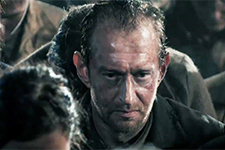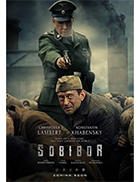Sobibor
|  Konstantin Khabenskiy’s directorial debut Sobibor (Собибор) is not the first film to dramatize the horrors of the titular Nazi death camp in eastern Poland and the subsequent uprising and mass escape of hundreds of prisoners in October 1943—one of only two such successful attempts during the entirety of the war. It had previously been the subject of one part of the four-part 1978 American television miniseries Holocaust and the 1987 British made-for-television movie Escape From Sobibor starring Rutger Hauer, as well as two documentaries, the 1990 Dutch-Soviet co-production Revolt in Sobibor and Sobibór, October 14, 1943, 4 p.m., directed by Claude Lanzmann (Shoah). The appeal of the story is undeniable, as it merges the horrors of the Holocaust with a gripping narrative about the incessant will to survive. Khabenskiy, an actor who also plays the lead role of Alexander “Sasha” Pechersky, a Russian-Jewish prisoner of war who helps organize and lead the revolt, handles the material well, although he often submits to an attention-grabbing aesthetic impulse that renders some of the film’s most impactful moments overwrought. The entirety of the film takes places in and around the Sobibor extermination camp. We first see a train arriving at the platform with carloads of well-dressed European Jews who have been rounded up and transported, thinking that they are to be resettled in Sobibor for the duration of the war (a loud speaker ominously intones a welcome message to their “new life”). It is all subterfuge, however, as the women are stripped naked and, under the pretense of being showered to avoid disease outbreaks, are summarily gassed, a horrific process that took place day after day after day at Sobibor, where an estimated 250,000 Jews were murdered as part of Operation Reinhard between 1942 and 1943. Those who are not gassed are kept as workers at the camp, laboring to clear the forest, dig mass pits, burn bodies, sort through the victims’ belongings, and bear the brunt of the SS officers’ sadism (at one point they stage a grotesque late-night carnival of sorts, with the drunken officers riding on carts pulled by the prisoners like horses). The camp is overseen by Karl Frenzel (Christopher Lambert), who is both sadistic and seemingly bored with the brutal operations at the camp. The other primary officers, played by Wolfgang Cerny, Maximilian Dirr, and Philippe Reinhardt, range from the casually cruel to the clearly psychotic. Sasha, who was an officer in the Soviet Red Army before being captured, arrives at Sobibor after having attempted an earlier uprising in the Minsk ghetto, which led to the murder of many others as punishment. Thus, his desire to rebel is weighted beneath the guilt of his previous failure, although that weight is shifted when he and others learn that there is a high degree of likelihood that the camp will soon be liquidated, at which point they will all be murdered. The reality of that horror is powerfully visualized late in the film when a train arrives that is loaded entirely with piles of corpses—a sharp-edged indication of just how far the “final solution” has progressed since the opening scene when the prisoners arrived standing and still dressed in their best clothes. Part of the film’s subtext is how the wheels are slowly coming off the Nazi machine, which fuels the pressure on Sasha and his close group of collaborators to execute their escape plan (which he insists must involve the entire camp escaping, even though most of the prisoners must be kept in the dark about it) and on the SS officers to slaughter as many Jews as possible. The horrors of genocide are hastened by the encroaching Soviet army and the inner rot of the Nazis themselves, who become so accustomed to their grisly operation that they cease to have anything about them that is even remotely human. The depiction of the escape itself is expertly rendered by Khabenskiy, who digs deep into vast wells of Hitchcockian suspense to wring as much tension as possible out of a plan that has virtually every reason to fail. Sasha conspires with others to lure the SS officers into various buildings by offering them new coats or boots so that they can be quickly and silently killed with whatever sharp instruments the prisoners have on hand, which mostly means axes, chisels, and scissors (using the Nazis’ insatiable greed against them is a particularly brilliant ploy). It is grim, bloody business, much of which must be undertaken by ordinary people who have never killed before. The “will he or won’t he?” tension is particularly fraught when the first officer is lured in, thinking he will be given a new leather coat, and the would-be assassin hesitates so long that the plan almost collapses right there. But, in the end, everyone goes through with their obligation, and the film clearly aspires to a sort of queasy catharsis as we watch the former victims enacting not just bloody, but positively gruesome, vengeance on their tormentors, with one character bludgeoning an SS officer’s head until it is virtually unrecognizable as human. Khabenskiy does not minimize the visceral impact of the violence nor the effect it has on those enacting it, particularly the young boy who is tasked with bringing the officers to their fate. Killing is killing, and it takes its toll. As powerful as Sobibor is at its best, Khabenskiy and cinematographer Ramunas Greicius make the frequent mistake of giving too much aesthetic attention to the visuals. The long shots of the extermination camp, always shrouded in fog and smoke that bloom artfully in the search lights, gives the film the visual air of a gothic horrorshow. Khabenskiy relies heavily on moody choral music to underscore the epic nature of the inhumanity on display, which at times works and at other times simply feels like too much (we sense this particularly in the early scene when all the women are gassed and their bodies are arranged on the floor like a medieval painting of Dante’s Inferno). His biggest mistake, though, comes during the escape, when he constantly intercuts the chaos with extreme slow motion shots of various characters running, which weakens the intensity of the frenzied action he has so successfully orchestrated. His desire to single out various characters in the pandemonium is understandable, but it feels overly mannered, which strips us out of the moment and reminds us not just that we are watching a recreation, but that such recreations have definite limits in the face of real historical horrors. Sobibor is, as a whole, a fine and moving film, but one can’t help but wish that Khabenskiy had better trusted the inherent impact of the story and not tried to escalate it quite so much. (On a political/historical note, Sobibor is an intriguing production because, until now, the Russian film industry has produced virtually no films that even mention the Holocaust and Russian historians, even after the fall of the Soviet Union, have done little work on the subject, which has led to a disturbing lack of historical knowledge about the Holocaust throughout the country. According to Izabella Tabarovsky, writing in the Kennan Institute’s The Russia File blog, the idea for the film was originally hatched by Vladimir Medinsky, the head of the Russian Ministry of Culture, which financed its production, and it has enjoyed major support and promotion by the Kremlin, to the point that it was on the agenda of not one, but two summits between Russian President Vladimir Putin and Israeli Prime Minister Benjamin Netanyahu. Tabarovsky argues that the film’s international promotion is part of Russia’s larger goal of ensuring the country’s place in the historical record as “the liberator of Europe from Nazism,” even though the Soviet government engaged in its own explicitly anti-Semitic agenda after the war, which included persecuting the film’s hero, Alexander Pechersky, who has only recently been recognized for his deeds. One can only hope that the film helps to shed more light on the subject of the Holocaust, not only in Russian, but elsewhere.) Copyright © 2019 James Kendrick Thoughts? E-mail James Kendrick All images copyright © Samuel Goldwyn Films |
Overall Rating: 

 (3)
(3)


